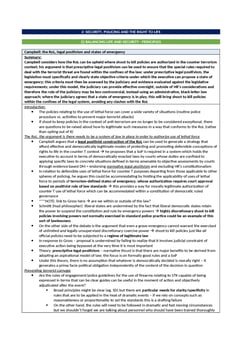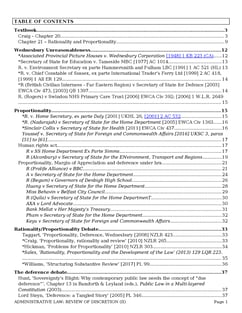- Law Cases
- Administrative Law Cases
- The Human Rights Act 1998 impact on administrative law; Control of discretion Cases
A and X v Secretary of State for the Home Department [2004] UKHL 56; [2005] AC 68
Judgement for the case A and X v Secretary of State for the Home Department
KEY POINTS
The UK's Human Rights Act 1998 (c 42) safeguards the fundamental right to liberty, extending to suspected international terrorists.
Derogation from human rights, allowing the detention of non-national suspects who can't be deported, prompts scrutiny for justification amid potential public emergencies.
The evaluation assesses if measures are strictly necessary and whether there's unjustifiable discrimination.
The Anti-terrorism, Crime and Security Act 2001 (c 24), especially section 23, and the Human Rights Act 1998 (Designated Derogation) Order 2001 (SI 2001/3644) play roles.
The Convention for the Protection of Human Rights and Fundamental Freedoms (1953) (Cnd 8969), notably Article 15, is a reference point in evaluating human rights for suspected international terrorists.
FACTS
Following the 11 September 2001 terrorist attacks in the United States, the UK Government determined that a public emergency, threatening the life of the nation, existed as per Article 15 of the Convention for the Protection of Human Rights and Fundamental Freedoms.
The Human Rights Act 1998 (Designated Derogation) Order 2001 was issued, outlining the proposed derogation from the right to personal liberty under Article 5(1) of the Convention.
Section 23 of the Anti-terrorism, Crime and Security Act 2001 allowed the detention of non-nationals deemed a risk to national security and suspected terrorists who couldn't be deported due to safety concerns or practical issues.
Nine detainees under the 2001 Act appealed to the Special Immigration Appeals Commission, which acknowledged the public emergency and upheld the government's right to derogate under Article 15.
-
However, it quashed the 2001 Order, declaring Section 23 incompatible with Articles 5 and 14 of the Convention.
This was due to the provision permitting the discriminatory detention of suspected terrorists based on nationality, excluding British suspects.
The Court of Appeal later sided with the Secretary of State, allowing the appeal and dismissing the appellants' cross-appeals.
JUDGEMENT
-
The majority, with Lord Hoffmann dissenting, held that in light of the European Court of Human Rights jurisprudence and the nature of the large-scale terrorist attacks, the absence of an immediate threat did not invalidate the assessment of a risk of a terrorist attack at an unspecified time.
Given the political character of such assessments, the executive and Parliament's judgment carried great weight.
The commission's examination was deemed proper, and there was no basis to dispute the conclusion of a public emergency threatening the nation's life under Article 15.
-
The majority, per Lord Bingham of Cornhill, Lord Nicholls of Birkenhead, Lord Hope of Craighead, Lord Scott of Foscote, Lord Rodger of Earlsferry, Baroness Hale of Richmond, and Lord Carswell, asserted that while protecting national security was a matter of political judgment, national courts were obligated to provide effective protection for Convention rights, subject to an intensive review.
The right to personal liberty, being fundamental, warranted scrutiny.
Section 23 of the 2001 Act was deemed disproportionate, not strictly required by the situation, and unjustifiably discriminatory against non-nationals suspected of international terrorism.
The Derogation Order was to be quashed, and section 23 was declared incompatible with Articles 5 and 14.
The appeals were allowed, with Lord Walker of Gestingthorpe dissenting, resulting in quashing the Derogation Order and the declaration of section 23's incompatibility with Articles 5 and 14.
Lord Hoffmann
He dissented, asserting that terrorist violence did not pose an emergency threatening the life of the nation, and therefore, the appeals should be allowed on that basis.
The decision of the Court of Appeal [2002] EWCA Civ 1502; [2004] QB 335; [2003] 2 WLR 564; [2003] 1 All ER 816, CA, was reversed.
COMMENTARY
The case revolves around the indefinite detention of non-nationals suspected of involvement in international terrorism under Section 23 of the Anti-terrorism, Crime and Security Act 2001.
The House of Lords expresses concerns about the differential treatment of nationals and non-nationals, emphasising upon the fundamental right to individual liberty.
The court concludes that Section 23 is incompatible with certain articles of the European Convention, highlighting the importance of safeguarding human rights, even in matters related to national security.
ORIGINAL ANALYSIS
Case on detaining indefinitely foreign terror suspects without trial.
Under Anti-terrorism, Crime and Security Act 2001 (c 24), s. 23 the govt detained non-nationals whom it suspected of terrorism whom it wished to deport but could not out of fears for their safety/other practical problems etc.
The govt also announced that it would be derogating from the right to personal liberty, as set out under art. 5 of ECHR. HL said that the legislation was ECHR incompatible and therefore a s.4 declaration would be made.
Lord Bingham (with majority)
“In Smith and Grady v United Kingdom (1999) 29 EHRR 493 the traditional Wednesbury approach to judicial review (see Associated Provincial Pictures Houses Ltd v Wednesbury Corpn [1948] 1 KB 223) was held to afford inadequate protection.
It is now recognised that "domestic courts must themselves form a judgment whether a Convention right has been breached" and that "the intensity of review is somewhat greater under the proportionality approach"
Said that the threat was a political question and a hard one on which reasonable minds differ, so that “great weight” should be given to the judgement of the Home Secretary and it would be wrong for the court to deny a situation threatening the life of the nation existed.
He accepted the arguments that terrorism was not just threatened by foreign nationals and that there were non-detention based ways of stopping terrorism as these are used on British suspects. Building on this he came to the highly political decision that the act was not a rational way of fighting terrorism since it only related to foreigners and therefore the discrimination made no sense and was therefore disproportionate to security needs.
He also accepted that the courts are entitled to review derogation orders on proportionality grounds. This is consistent with other areas of judicial review.
Given what is said above, the derogation order is disproportionate given how fundamental the right to liberty is and how discrimination is contrary to UK law.
Baroness Hale
Adds that although it might sometimes be acceptable to treat aliens differently, in this case it is not and is not proportionate to how much it would help fight terrorism, which in the majority’s view is not much. How can they make such a political call?
Simply because the removal of most suspected terrorists will not solve all terrorism problems doesn’t mean it wont help greatly.
They should be intellectually honest and say that his is really about rights vs security and that rights win.
Lord Walker (dissenting)
The threat is massive and the court would be right to err on side of safety, as was accepted in Ireland v UK. It’s not a discrimination based on race but on right to be in UK (to extend this to UK nationals would in fact be far more oppressive).
He also says that if we accept that govt will know better than the court how great the threat is (e.g. secret intelligence sources etc.) then it is the govt too who will know whether the derogation order and the acts made on the basis of this derogation are justified.
Lord Hoffman
(Agreeing with majority conclusion, but on different basis)
Physical terrorist violence is not threatening the life of the nation.
-
“The real threat to the life of the nation, in the sense of a people living in accordance with its traditional laws and political values, comes not from terrorism but from laws such as these. That is the true measure of what terrorism may achieve. It is for Parliament to decide whether to give the terrorists such a victory.”
I.e. he says that terrorism is not really threatening our institutions and way of life as defined by rule of law, right to liberty etc. Therefore a derogation from these and an act against these is unconstitutional.
He rightly does not try to avoid making a call as to the size of the threat. If there are clear criteria, e.g. “threat to the nation” then there is no reason why the courts cannot determine such questions. It makes far less sense to say that “is there a threat” is political, but “is the response proportionate” is not political.
RELATED CASES
For Further Study on A and X v Secretary of State for the Home Department
Need instant answers? Our AI exam tutor is here to help.
Ask questions 🙋 Get answers 📔 It's simple 👁️👄👁️
Our AI is educated by the highest scoring students across all subjects and schools. Join hundreds of your peers today.
Get StartedSimilar Cases
Related Product Samples
These product samples contain the same concepts we cover in this case.


